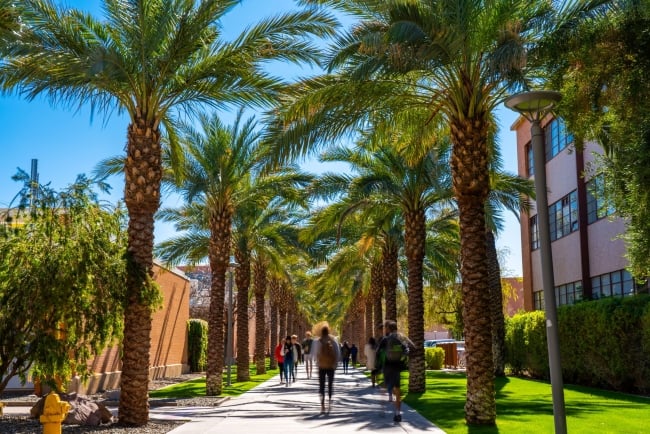You have /5 articles left.
Sign up for a free account or log in.

Arizona State University students will complete a three-credit course on sustainability as part of a new general education requirement.
yongyuan/iStock/Getty Images Plus
Arizona State University’s general education overhaul includes a new innovation: a required three-credit course focused on sustainability.
The university was the first U.S. institution, in 2006, to open a School of Sustainability, and the new gen ed requirement adds the institution to a short list of colleges that require climate-focused courses in all students’ degree progression.
So what? Climate change and climate anxiety are some of the top issues among young people and college students.
A February 2023 Student Voice survey by Inside Higher Ed, conducted by College Pulse, found 81 percent of college students are at least somewhat worried about climate change, with 42 percent saying they are very worried.
More recently, a May 2024 survey from the Generation Lab found one-third of college students ranked climate change as a top issue that is important to them, following health-care reform (40 percent), education funding and access (38 percent), economic fairness and opportunity (37 percent), and racial justice and civil rights (36 percent).
Pew Research Center also conducted a survey in April and found 59 percent of young Americans (ages 18 to 29) believe dealing with global climate change should be a top priority in the U.S.’s long-range foreign policy.
ASU’s general education requirement helps give students the tools to talk about climate change and sustainable development solutions as well as the historical impacts of various factors on the environment.
How it works: All students, regardless of major, will fulfill a three-credit course that address sustainable development, socio-ecological systems and how they relate to global challenges and opportunities.
“The learning objectives emphasize systems thinking, where human and non-human systems are understood as intimately connected, with human actions affecting all life on a planet with limits and boundaries,” according to ASU’s website.
One of the key outcomes is learning to speak about approaches to address questions or challenges in the work that use sustainability concepts or practices.
“It’s the ability to articulate possible solutions and opportunities, so sustainability is not just a burden that’s imposed on society,” said José Lobo, associate professor in the School of Sustainability, in an April press release. “It’s not just abstract: ‘Sustainability is good for the planet, therefore take a course on it,’” but rather shows ASU’s commitment to a modern undergraduate education that includes an appreciation of sustainable development.
Some examples of applicable classes in the current course catalog are the Sustainable Plate; Wilderness and Parks in America; and Society, Supply Chains and You—falling under the College of Global Futures, the Watts College of Public Service and Community and the W. P. Carey School of Business, respectively.
Returning students will not have to complete a sustainability course to fulfill degree requirements.
Re-Evaluating general education: The addition of a sustainability course was part of a larger focus to increase interdisciplinary learning through general education courses that started four years ago, in 2020.
ASU hadn’t overhauled its set of general studies requirements since the 1980s, according to a university press release. One of the goals of the redesign was making the core curriculum more accessible to all types of students, including first-years, transfers and those returning after a pause in their education.
“We wanted to facilitate success and have people be able to navigate the system without barriers,” Anne Jones, vice provost for undergraduate education, said in the release.
A faculty group met to review requirements of other institutions and collect feedback from more than 10 percent of ASU’s faculty, which culminated with approval by the Faculty Senate.
Now, students will complete 35 credits in nine categories, not including the first-year composition course.
ASU offers three climate-focused majors as well: a bachelor of arts in sustainability, a bachelor of science in sustainability and a bachelor of science in sustainable food systems.
Get more content like this directly to your inbox every weekday morning. Subscribe here.








